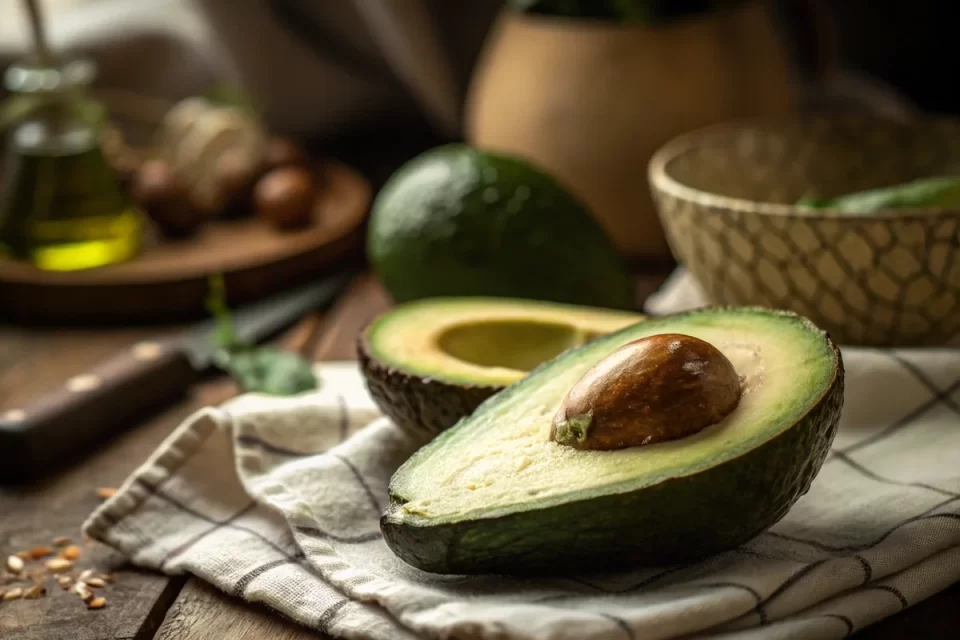Avocado (Persea americana), often referred to as nature’s butter, is a creamy, nutrient-dense fruit celebrated for its versatility in cuisines worldwide. With its rich texture and mild, nutty flavor, avocado enhances dishes while offering significant health benefits. This article explores avocado’s historical role in food, its nutritional profile, evidence-based health benefits, practical tips for use, and complementary food pairings, supported by scientific research.
History of Avocado in Culinary Traditions
Avocados originated in Mesoamerica, with evidence of cultivation dating back to 5000 BCE in Mexico and Central America. The Aztecs named it ahuacatl, meaning “testicle” due to its shape, and used it in dishes like guacamole, a blend of mashed avocado, chilies, and tomatoes. By the 16th century, Spanish explorers introduced avocados to Europe, where they were initially a curiosity. In the 19th century, avocados spread to Asia, Australia, and beyond, becoming a staple in tropical and subtropical cuisines. Today, avocados are integral to Mexican salsas, Japanese sushi, Australian breakfast toasts, and Mediterranean salads, showcasing their global appeal and adaptability across sweet and savory dishes.
Nutritional Profile
Avocados are nutrient-dense, offering healthy fats, fiber, and a range of vitamins and minerals. Per 100 grams (approximately half a medium avocado):
- Calories: 160 kcal
- Protein: 2g
- Fat: 14.7g (2.1g saturated, 9.8g monounsaturated, 1.8g polyunsaturated)
- Carbohydrates: 8.5g (6.7g fiber, 0.7g sugars)
- Vitamins and Minerals:
- Vitamin K: 21µg (18% Daily Value)
- Vitamin C: 10mg (11% DV)
- Vitamin E: 2.1mg (14% DV)
- Folate: 81µg (20% DV)
- Potassium: 485mg (10% DV)
- Magnesium: 29mg (7% DV)
Avocados also contain bioactive compounds like lutein, zeaxanthin, and phytosterols, contributing to their health benefits.
Note: Nutritional values are based on USDA data for raw Hass avocados. Values may vary slightly depending on variety (e.g., Hass vs. Fuerte) or ripeness.
Health Benefits
Avocados’ health benefits are driven by their monounsaturated fats, fiber, and antioxidants, supported by scientific research. Below are key benefits:
- Heart Health: Avocados’ monounsaturated fats and potassium support cardiovascular health. A meta-analysis in The American Journal of Clinical Nutrition (2016) found that avocado consumption reduced LDL cholesterol by 10–13 mg/dL while maintaining HDL cholesterol levels.
- Eye Health: Lutein and zeaxanthin in avocados protect against age-related macular degeneration. A study in Nutrients (2017) showed that avocado intake increased macular pigment density, supporting eye health.
- Digestive Health: High fiber content promotes healthy digestion and regular bowel movements. Research in Journal of Nutrition (2013) linked avocado fiber to improved gut microbiota diversity.
- Weight Management: Avocados’ fiber and healthy fats promote satiety. A study in Nutrition Journal (2013) found that adding half an avocado to a meal increased feelings of fullness and reduced snacking by 23% over 5 hours.
- Skin and Hair Health: Vitamins C and E, along with healthy fats, support skin elasticity and hair strength. A review in Dermatology Practical & Conceptual (2018) noted avocados’ role in skin protection due to their antioxidant content.
Note: Benefits are maximized with moderate consumption (e.g., 1/2 to 1 avocado daily). Those with latex-fruit syndrome should consult a healthcare provider due to potential allergic reactions.
Tips for Using Avocado
- Ripeness: Choose avocados that yield slightly to gentle pressure. Ripen firm avocados in a paper bag at room temperature for 2–5 days; refrigerate ripe avocados to extend freshness for up to a week.
- Storage: Store cut avocados with the pit intact, brushed with lemon juice, and wrapped tightly to prevent oxidation. Use within 1–2 days.
- Preparation: Scoop flesh with a spoon or mash for spreads. Blend for smoothies or dressings to achieve a creamy texture.
- Cooking: Use raw or lightly heated to preserve nutrients; high heat can degrade flavor and healthy fats.
- Allergy Awareness: Check for latex-fruit syndrome allergies, which may cross-react with avocado. Store separately from allergens.
- Versatility: Use avocado as a fat substitute in baking (e.g., replace butter in muffins) or as a base for vegan desserts like mousse.
Food Pairings for Avocado
Avocado’s creamy texture and mild flavor complement a variety of ingredients, enhancing both nutrition and taste. Below are five healthy combinations:
- Avocado + Whole Grain Toast + Tomato: Spread mashed avocado on whole grain toast with sliced tomatoes for a fiber-rich breakfast high in lycopene and healthy fats.
- Avocado + Spinach + Lemon: Blend avocado with spinach and lemon juice for a creamy smoothie packed with vitamins C, K, and folate.
- Avocado + Black Beans + Cilantro: Combine in a salad or taco filling for a protein-packed dish with fiber and antioxidants.
- Avocado + Salmon + Dill: Pair sliced avocado with grilled salmon and fresh dill for a heart-healthy meal rich in omega-3s and vitamin E.
- Avocado + Quinoa + Pomegranate: Mix diced avocado with quinoa and pomegranate seeds for a nutrient-dense bowl high in fiber and antioxidants.
Scientific and Academic Support
Avocado’s benefits are backed by peer-reviewed research:
- Wang, L., et al. (2016). The American Journal of Clinical Nutrition: Avocado’s effects on cholesterol and heart health.
- Scott, T. M., et al. (2017). Nutrients: Avocado’s role in increasing macular pigment for eye health.
- Li, Z., et al. (2013). Journal of Nutrition: Avocado fiber’s impact on gut health.
- Wien, M., et al. (2013). Nutrition Journal: Avocado’s effects on satiety and weight management.
- Dreher, M. L., & Davenport, A. J. (2018). Dermatology Practical & Conceptual: Avocados’ benefits for skin health.
These studies confirm avocados’ potential to support heart, eye, and digestive health, though optimal portion sizes and long-term effects require further research.

